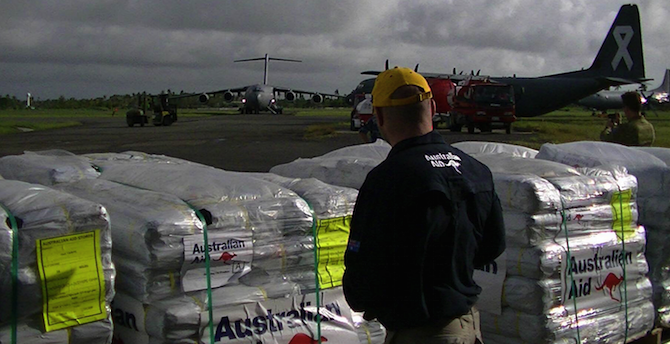Cutting Aid: Cutting Security?

Foreign aid is an important part of Australia’s international profile. With the federal budget being delivered in two weeks, there has been significant debate on the potential of further cuts to the aid program.
A number of Australians have signed onto an open letter with the intention of sending a very clear message to our political leaders: Australia has a long and proud history of helping to improve the lives of some of the poorest people in the world and this should be continued through a strong overseas aid program.
The letter, published in The Australian, is a response to the drastic cuts the Australian aid program has faced in recent years. It comes as the Turnbull Government deliberates whether or not to proceed with a further $224 million cut to the aid program in the upcoming federal budget due on 3 May. If these scheduled cuts are not reversed, Australia will become the least generous it has ever been in the history of its aid giving.
Support for Australian aid hasn’t just been lagging amongst the government benches however. While Tanya Plibersek, the Shadow Foreign Affairs and International Development Minister, has been vocal about Australia needing to do more, the Opposition Leader Bill Shorten has so far been noticeably quiet on this subject. One hopes that as we get closer to the likely 2 July election Shorten will outline a bold vision for Australia’s role on the world stage, which will hopefully include at the very least a commitment to reverse the latest round of aid cuts.
Having a strong aid program is critical if we are to achieve the goal, now embedded in the UN’s Sustainable Development Goals, of eradicating extreme poverty by 2030. World Bank projections show how tantalisingly close we are to achieving this once seemingly impossible goal following a quarter-century-long sustained reduction in poverty levels. Indeed, it is estimated that last year the number of people living in extreme poverty fell below 10 per cent of the world’s population for the the first time ever.
Further reductions however are not assured, especially if we continue on a business-as-usual footing. On current growth projections, anywhere between 100 million to 1 billion people could still be living in extreme poverty by 2030 unless we redouble our efforts.
This is where highly targeted and effective aid programs can play a critical role in ensuring that no one gets left behind and that the fruits of economic growth reach those in the most remote and marginalised communities.
Overseas aid is, of course, not a silver bullet. New sources of financing, including better use of domestic resources by developing and emerging countries themselves, will be needed. Nonetheless, aid will have an ongoing role to play for the foreseeable future, particularly for small, vulnerable states, many of which are in the Pacific, as well as post-conflict states.
Supporting efforts to end extreme poverty through a strong aid program is not just the right thing to do, its also one of the best investments we can make to keep Australia safe and secure. As U2’s Bono said when he testified before the US Congress last week, “the fact is that aid can no longer be seen as charity, as a nice thing to do when we can afford it … aid in 2016 is not charity – it is national security.”
Perhaps one of the best examples of foreign aid protecting Australian interests is a project initiated under the Howard Government. Over the last decade or so, Australia has deployed $300 million per year to Indonesia to build schools. Through addressing some of the underlying conditions that promote the emergence of terrorism, such investments have produced immeasurable benefits in remote communities that are often the breeding grounds for extremism. Education, after all, develops individual capacity for critical thinking, contributing to stronger democratic institutions, economic development, community resilience to violent extremism and better health.
This is equally true for the situation unfolding in the Middle East. As Bono went on to say in his congressional testimony last week: aid, when “structured properly”, is perhaps “the best bulwark we have against the violent extremism that is gaining traction in the Levant and the Sahel.” It is for this reason that Bono concluded his remarks by calling for an unprecedented and rapid scale-up in development assistance not seen since the days of the “Marshall Plan – history’s greatest example of national generosity as national security,” which transformed war-torn Europe.
Australia is not the United States. Nonetheless, we are, as Minister for Foreign Affairs Julie Bishop likes to say, a “Top Twenty Nation” and we could certainly contribute a great deal to a modern-day Marshall Plan. If realised, and properly implemented, we would have a lasting and positive impact on not just our own aspirations but, more importantly, those of the millions still living in extreme poverty in our region and beyond.
Michael Sheldrick is the Global Director of Policy and Advocacy with Global Citizen, an Australian-grown international advocacy group based in New York. This article is published under a Creative Commons Licence and may be republished with attribution.





